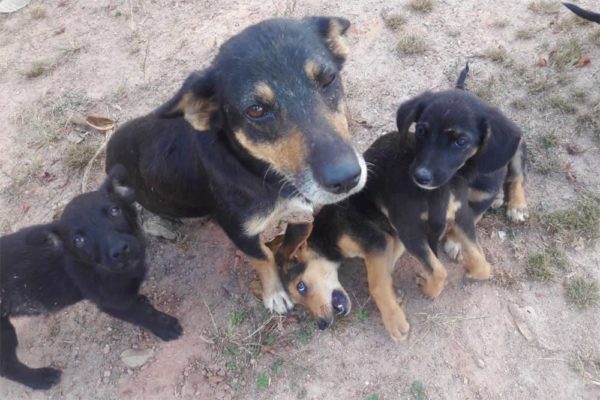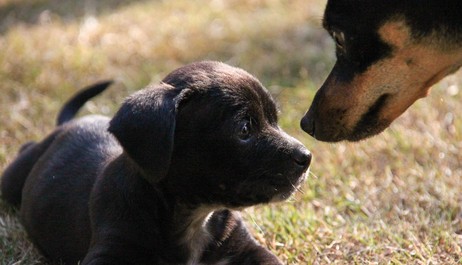How Long Do Mom Dogs Miss Their Puppies For?
The hormones released during pregnancy and birth, specifically oxytocin, will considerably increase the mother dog’s maternal instinct.
Oxytocin is known as the hormone of love and jealousy, which explains why mother dogs are so fiercely protective of their young whilst showing deep care and affection towards them.
The dog’s hormone levels will reduce gradually over time after the birth, and the intense maternal instinct will fade.
Some dogs retain their maternal instinct even after all of her puppies have been rehomed. They can display unusual behaviours like carrying around soft toys or caring for other dogs.
If you keep one of the puppies from the litter, the mother will likely form a close bond with it over time. This bond will be more akin to a dog friendship than a mother-child relationship.
There have been studies which suggest that the more litters a mother has, the less attached she becomes to the puppies. This would make sense given that she will begin to expect them to be taken away.
It is widely known that puppies should stay with their mother where possible until they are at least 8 weeks old.
This gives the mother time to teach the puppies important life lessons and social skills, like grooming and interaction with other dogs.
By this time, the mother’s teats will have begun to feel sore due to the puppies developing sharp teeth.
The puppies will be getting bigger and more active, making the mother feel more tired. She will likely begin to avoid her puppies for portions of the day to get some much needed rest and space.
Remember that the bigger the litter, the harder work it is for the mother and the more rest she will need.
Some mother dogs of certain breeds are able to remain with their puppies until the litter has reached 12 weeks of age- it depends on the temperament of the breed and personality of the individual dog.
Even so, make sure your mother dog has an area where she can take time for herself away from the puppies when she needs it.
This will help to avoid her snapping at the puppies or accidentally injuring them, and will reduce her stress levels.

Modern Dogs Have Adapted to Separating from Pups
How a mother dog reacts to her puppies being taken away at the right age all comes down to the individual dog.
Some mother dogs act aggressively toward their puppies if they continue to be with them after six months.
Other mothers mope around for a while when their puppies are taken. They even adopt surrogate puppies or the young of other species so they can still be motherly and look after babies.
Basically, the individual dog’s personality will determine how they react,if they miss their litter, and for how long.
Some dogs react to losing their litter by maintaining their motherly instinct in strange ways. Mother dogs have been known to use soft toys as puppy substitutes; carrying them around the same way they would their own puppy.
This could be a link back to their wolf ancestors where families often stayed together in a pack, or it could just be the motherly instinct is particularly strong in that dog.
Make sure when you do separate mother from puppies, she is given special attention with lots of hugs and adventures. Some of the things you could consider for the mother when removing puppies include:

- Remove only one puppy at a time for re-homing.
- Allow her to meet the families who are adopting her babies and let her see the puppies with them.
- Let her see the puppy get into their car and leave. This should stop her desperately trying to locate her puppy later on.
- Use a calming product on her if she becomes very upset. Talk to your vet as to the best one and how to use it.
Mother Dogs Naturally Wean Off Their Puppies
If you think it’s hard to decide on exactly when to remove the puppy, take heart in the fact the mother dog will do it naturally anyway.
As many breeders and dog families have seen, the mother dog will wean her puppies off herwhen she is ready and when she is over the work of raising puppies.
Do Mom Dogs Miss Their Puppies When They Leave?
MYTH: They’ll already be sad having “lost” their mother; therefore, separating pups from each other is cruel and it’s what causes them to cry the first few nights in the home. Dogs don’t have the same emotional bond with their families that humans do. A dog can be perfectly happy raised away from his littermates.